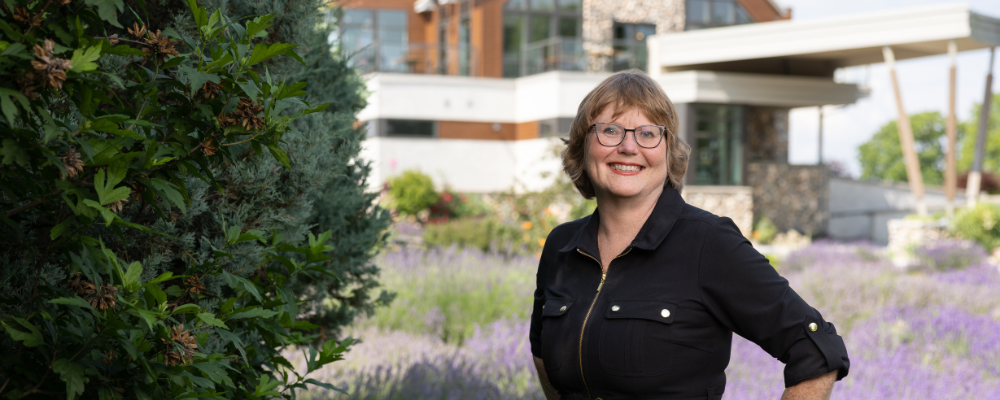Unbottling Success: Suzanne Dajczak (LL.B. '87) parlays disability practice into thriving vineyard
March 05, 2024

By Drew Hasselback
Suzanne Dajczak’s story is not unlike the puzzles she loves to tackle. It starts with a jumble of pieces — farming, wine, easements for fibre optic cable, a cash register at Woolco, lavender soap, cooking, gardening, and a fascination with reading medical reports — and these diffuse elements eventually snap together into a single picture that makes sense. What we ultimately see is a thriving practice in disability law that is run by a third generation farmer who with her husband also operates the North 42 Degrees Estate Winery in Colchester, Ontario.
“I love puzzles,” she says. “The devil is in the details.”
The legal angle to the story begins decades ago in the office of an estate lawyer. A lot of lawyers find their way to law school through TV courtroom dramas. Who doesn’t want to be the next Perry Mason, Mark McCoy or Alicia Florrick? But for Dajczak, the dream came as a small child following the death of her grandparents, who owned a farm near Windsor, Ontario.
“My grandparents passed away when I was quite young. So I got dragged to lawyers’ offices to help settle the estate,” she recalls. “I guess I was impressed, because I decided that was what I wanted to do.” Her grandfather had a will and a succession plan for the farm, and she was struck by how the lawyer was able to help the family put everything in motion.
“I saw a way that words could help,” she says. “That really appealed to me. So I ended up doing that.”
A deeper introduction to the law came through a high school internship program. While working as a cashier at Woolco, she chatted up a customer who ran a law firm. She secured a placement with the firm as part of that high school opportunity. She did her stint, and she was hooked.
Dajczak took economics courses at the University of Windsor for two years, then got accepted to Western Law. The school’s emphasis on corporate matters appealed to her, since she thought that would tie in with her grounding in economics.
Dajczak, who had arrived at Western Law after only two years of undergrad, credits her older, more mature classmates with taking her under their wing and helping ground her — something that she says wouldn’t have happened had she remained at home and pursued her law degree at nearby Windsor.
After she was called to the bar in 1989, she would work as an in-house lawyer for an engineering consulting firm in London, Ontario that among other things helped install a fibre optic cable link between Ottawa and Oshawa, with a spur off to Montreal. Much of that project involved real estate work, such as cleaning up issues with title and securing easement agreements.
Eventually, however, she missed home — particularly living close to the water and her family. She also missed living on a farm.
So she left London for a job in Leamington, where she did some litigation and real estate law for about six months. She wasn’t super happy, so she switched to a legal aid clinic, where she found herself helping clients with social assistance matters, Canada Pension Plan applications, and disability litigation. It was there that the light went off. Disability cases, she says, always come down to the medical reports. Workplace injuries involve far more than just the immediate result of an accident, she explains. You have to look at the “minutiae” of the person’s entire medical history to understand how the client’s pre-existing medical conditions will shape how they respond to the injury.
And the puzzle doesn’t stop there, shecontinues. She needs to understand howthe person will be able to handle a change in working conditions — whether they have learning disabilities or mental health issues that might make it difficult for them to develop new skills. “The answers usually lie in those medical reports.”
Her fascination with the field drew her in deeper, leading to her receiving a law society designation as a certified specialist in workplace safety and insurance law in 2001.
There’s a line between her disability practice and the vineyard. Dajczak attended a conference on disability law in the Niagara Peninsula. She saw the wineries there, and it reminded her of her love for farming. When she returned home, she mentioned this to her husband, who is also from a farming family. It turns out he had been thinking the same thing; in fact, he’d even, unbeknownst to her, developed a business plan for how a vineyard and winery could work. North 42 Degrees Estate Winery was born.
The couple’s first grape crop was planted in 2007 and first harvested in 2012. Today, they have two vineyards, one 17 acres and the other six, and they operate a hospitality and tasting centre. The operation employs about 45 people.
The farming doesn’t stop there. The couple also grows lavender, which they use to make soap. Beyond the business, Dajczak has a two-acre garden on the couple’s four-acre residential property. “It’s a stress reliever,” she says. “There’s instant gratification in pulling those weeds.”
“I’m still a farm girl at heart,” she says. “Put me in a farm field. I’m happy.”
For Dajczak, disability lawyer and farmer, that means the picture is complete.
Drew Hasselback is supervisor of the copy desk at Global News. He received his LL.B. from Western Law in 1996 and was called to the bar in 1998.
This article appeared in the 2023 edition of the Western Law Alumni Magazine. Read the full issue here.






